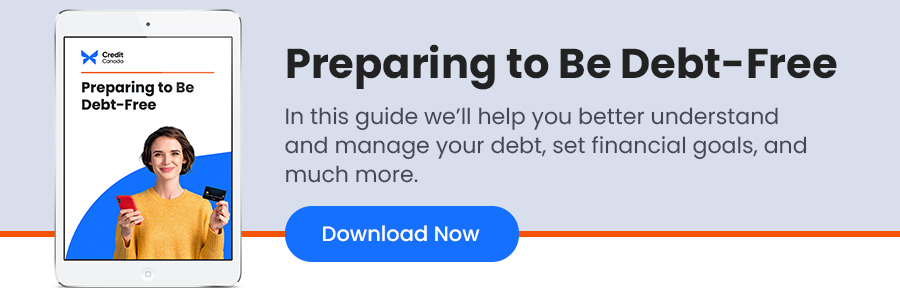
Excessive debt and frequent debt collection calls can make anyone feel anxious. Sleepless nights, arguments with loved ones, and rejections of applications are just a few trickling effects, along with the fear of debt collectors taking you to court.
Sound familiar? You’re not alone. Credit Canada’s certified credit counsellors have helped thousands of Canadians like you find relief from debt. But where does Canadian law draw the line on collection calls?
We’ll help you understand what debt collectors can and can’t do, so you can know your rights and address your debts with confidence.
What Are the Debt Collection Laws in Canada?
Each province has unique rules and regulations for how debt collection agencies can go about their business. These rules include permissible times of day to call you and the frequency of those calls. Keyword, province. Not Canada. Many debt collection and consumer protection laws are regulated by the provinces. Unfortunately, the confusion surrounding provincial differences gives unruly collection agencies more leeway to exploit uninformed consumers.
For example, debt collection in Ontario must abide by the Collection and Debt Settlement Services Act. One notable rule here is that creditors can only take legal action against debtors within a statute of limitations of two years. On the other hand, Quebec’s Consumer Protection Office declares a statute of limitations of three years. Meaning? There isn’t a Canada-wide law for everything about debt collection. So if it’s been over two years and a collection agency is threatening legal action in Ontario, that’s simply an intimidation tactic.
Curious about other potential intimidation tactics you might be a victim of? Keep reading for more insights.
Struggling to keep up with your debt payments? Our debt management support can help you consolidate your debt and reduce your interest rates. Learn More today.
The 15 Most Common Questions About Debt Collection Agencies in Canada
Our credit counsellors have heard countless concerns from clients about debt collectors. So, we decided to put them all into this guide for your reference.
1. What Should I Do When a Debt Collector Calls?
We know; it’s tempting to just put your phone on vibrate mode. Unfortunately, these calls won’t cease until you deal with them. Your best bet is to answer the call and find out exactly which creditor, debt, amount, and timeline they’re calling about. Make sure you also collect personal details like name, organization, phone number, and the position of the person calling.
It’s possible there could be an error, and you can settle it quickly. Remember to record the call — it’s always prudent to have a record of each conversation to help you keep collectors accountable if they break any laws.
Next, don’t reveal too much. They’re likely recording the call for their legal protection as well. Find out exactly what they’re calling about and sit with that information for a bit. They’ll surely call again, and you’ll feel more aware and equipped for what to do next.
If you’ve verified the debt is yours, your best bet is to pay it. If you can’t, try to work out a payment plan with the collector.
Want to know how long it will take to pay off your debt? Use our free debt calculator to create a customized repayment plan. Calculate Now.
2. Can I Ignore a Collection Agency?
You can, but it won’t solve your problem. Debt collectors are for-profit businesses that get paid when they settle your debt — so they won’t just stop. Plus, ceased calls could even mean legal action is in the works. If the agency successfully sues you, you could face wage garnishment or other consequences like liens on assets — so it’s best to work with them.
If you can’t pay the debt, you should still pick up the phone and tell the collector what you plan to do and negotiate a payment plan. Don’t worry; if you need support, our certified credit counsellors can help you negotiate.
3. When Can a Debt Collector Call Me?
Luckily, most provinces can agree upon appropriate timing and frequency for debt collection calls. Canada’s Financial Consumer Agency dictates the following times when debt collectors can call:
-
Monday through Saturday between 7 am and 9 pm
-
Sundays between 1 pm and 5 pm
And if you’re in Quebec? They’re not legally permitted to even call you on Sundays.
And debt collectors are not allowed to contact you on statutory holidays. If a debt collector breaks any of these collection laws in your province, you can file a complaint with the appropriate consumer protection office.
Want to stop collection calls? In most provinces, you can request that the agency stops calling you and that they only communicate with you by mail.
4. How Many Times a Day Can a Collector Call You?
In Ontario, Nova Scotia, and Alberta, a debt collection agency cannot legally contact you more than three times within seven days — unless you give them consent. Anything more than that is considered harassment.
Other provinces like Manitoba don’t explicitly list a limit to the number of times a collector can call, but they note harassment isn’t permitted. Contact your provincial government for more details on what harassment constitutes in different provinces.
5. How Long Can a Credit Card Company Pursue a Debt in Canada?
If you’ve been hounded for years or a 20-year-old debt is haunting you, you may wonder if it’s legal anymore.
Each province’s statute of limitations dictates how long a creditor has to take legal action against you to settle a debt. Remember that the statute of limitations starts from the “date of last activity,” which you can easily determine by checking your credit report. Here’s a list of each province and territory, along with their corresponding statue of limitations:
|
Province/Territory |
Statute of Limitations |
Government Source |
|
Ontario |
2 years |
|
|
New Brunswick |
2 years |
|
|
Nova Scotia |
2 years |
|
|
Prince Edward Island |
6 years |
|
|
Quebec |
3 years |
|
|
Manitoba |
2 years |
|
|
Saskatchewan |
2 years |
|
|
Alberta |
2 years |
|
|
British Columbia |
2 years |
|
|
Yukon |
6 years |
|
|
Northwest Territories |
6 years |
|
|
Nunavut |
6 years |
While collection calls can continue long after the statute of limitations is up, any legal action they threaten you with would be an empty threat. Keep in mind that some debts are excluded from these rules, like unpaid taxes and student loans.
6. Can a Collection Agency Take You to Court?
Collection agencies use many tactics to persuade debtors to pay. One tactic involves threatening a lawsuit, criminal prosecution, wage garnishment, or even jail time when they have no authority to do so. They might even refer to fabricated sections of legal acts to intimidate you.
Can debt collectors take you to court over your outstanding debts? In some cases, they can. But they cannot get you thrown in jail just for having an outstanding debt.
A debt collector or creditor can pursue a civil case against you in court and seek a judgment to have your wages garnished to repay the debt. However, this can only be done within the statute of limitations.
Collectors, on behalf of the creditor, must take you to court first and win before any garnishment of wages or similar actions can take place—except for money owed to the government or a credit union. These organizations can issue wage assignments, similar to wage garnishments, without going through the courts.
7. Can Collection Agencies Take Money from My Bank Account in Canada?
Yes, if a creditor is successful in legal action against you, the court might grant them permission to garnish your wages and take money from your bank accounts.
However, going to court is costly for both parties. Some creditors may be willing to waive or reduce fees or interest charges in exchange for not having to go to court or reduce the risk of you filing for bankruptcy.
8. Can a Debt Collector Use Threatening Language?
No. By Canadian law, collection agents are not permitted to use profane or intimidating language when dealing with debtors. If you experience this type of behaviour, report the collection agency to your province’s consumer protection office. And if the agency is from a federally regulated institution, report it to Canada’s Financial Consumer Agency.
9. Can a Debt Collector Call People I Know?
Yes and no. Debt collectors are allowed to contact your family, friends, neighbours, employer(s), and the like, but only to attempt to get your phone number and address, or to confirm your employment. In doing so, they cannot discuss your debt with these people, and once they’ve made contact, they cannot call them again.
There are exceptions, however. For example, suppose the person being contacted co-signed your loan, or you’ve previously given the financial institution permission to contact the individual. In that case, the institution may be able to discuss your debt with that person.
10. What Do I Do If I’m Receiving Calls About a Debt I Don’t Recognize or I’ve Already Paid?
Debt collectors are human too, and they can make mistakes. Sometimes it’s due to similarities in names, phone numbers, or out-of-date information. Your first order of business is to gather all information you can about the debt in question, including the dates, creditor, debt collection agency, and anything else pertinent. It’s possible you co-signed the credit account with someone else, in which case you’re equally responsible. Remember, you cannot inherit debts from someone who passes away.
If you’ve already paid the debt, share relevant documentation (scanned copies, not originals) with the debt collection agency. It’s possible their records simply didn’t reflect the updated account.
Next up, order a copy of your credit report from Equifax or TransUnion, and see if you notice the debt there. If the debt is there and you’re certain it’s not yours, contact the credit bureau and inform them of the mistake. Make sure you attach all relevant documentation. Once the credit bureau relieves you of the debt on your report, share relevant documentation with the debt collection agency.
If the collection agency persists, get whatever information you can and then inform them that you know it’s illegal to harass someone for a debt they don’t owe. If you continue to receive calls, file a complaint with your province’s consumer protection office in your province.
11. What if the Debts in Collection Are Due to Identity Theft?
If the debt looks legitimate, but you know it’s not yours, you may have become a victim of identity theft. You must contact your creditors and the credit bureaus (Equifax and TransUnion).
Put a fraud alert on your credit report and get copies to see if other debts aren’t yours. It’s also a good idea to file a police report. Reclaiming your identity and fixing your credit after a case of identity theft is a long, complicated, and difficult process. The sooner you can start, the better.
12. Can Collection Agencies Charge Interest in Canada?
Collection agencies are allowed to charge the interest rate on the debt as long as they are permitted by the original creditor. The original creditor agreement outlines whether the original creditor allows the third party to continue charging the interest rate after the debt is defaulted. They may only charge interest and fees as they were outlined in the original contract. However, if the original creditor does not outline in their original agreement that a third party can charge interest after default, then the collection agency cannot.
A debt collection agency can't add any collection-related costs to the amount you owe other than:
- legal fees
- fees for non-sufficient funds on payments that you submitted
13. Will Debt That Has Gone to Collection Hurt My Credit Score? For How Long?
Unfortunately, debt collectors can report unpaid debts to credit bureaus even before a court judgement is made on the debt. So yes, debts that go to collections agencies do hurt your credit score.
Payment history is one of the biggest factors that credit bureaus look at when determining credit scores. It takes six years for an unpaid debt to clear from your credit report.
Looking to improve your credit score? Our credit counselling services provides personalized strategies to help you achieve your financial goals. Start Building Your Credit Today
14. What If a Debt Collector Doesn’t Want to Work With a Payment Plan?
We’ve seen some clients encounter brick walls when collection agencies refuse a payment plan. If a debt collector demands payment within a timeframe that’s unreasonable for your situation, you should seek support in negotiating. Call a credit counsellor today.
Contact Credit Canada for Debt Relief
The best way to manage collection services is to know your rights. Review our list of commonly asked questions and refer to the Office of Consumer Affairs (OCA) for more information. But if you still feel overwhelmed by collection calls? You don’t have to tackle your debt alone.
Our certified, non-profit credit counsellors can help you evaluate your options for how to deal with debt collectors when you can’t pay. Call us today!

Frequently Asked Questions
Have a question? We are here to help.
What is a Debt Consolidation Program?
A Debt Consolidation Program (DCP) is an arrangement made between your creditors and a non-profit credit counselling agency. Working with a reputable, non-profit credit counselling agency means a certified Credit Counsellor will negotiate with your creditors on your behalf to drop the interest on your unsecured debts, while also rounding up all your unsecured debts into a single, lower monthly payment. In Canada’s provinces, such as Ontario, these debt payment programs lead to faster debt relief!
Can I enter a Debt Consolidation Program with bad credit?
Yes, you can sign up for a DCP even if you have bad credit. Your credit score will not impact your ability to get debt help through a DCP. Bad credit can, however, impact your ability to get a debt consolidation loan.
Do I have to give up my credit cards in a Debt Consolidation Program?
Will Debt Consolidation hurt my credit score?
Most people entering a DCP already have a low credit score. While a DCP could lower your credit score at first, in the long run, if you keep up with the program and make your monthly payments on time as agreed, your credit score will eventually improve.
Can you get out of a Debt Consolidation Program?
Anyone who signs up for a DCP must sign an agreement; however, it's completely voluntary and any time a client wants to leave the Program they can. Once a client has left the Program, they will have to deal with their creditors and collectors directly, and if their Counsellor negotiated interest relief and lower monthly payments, in most cases, these would no longer be an option for the client.
Budget Planner + Expense Tracker
Easy money management is possible with our all-in-one budgeting template. Take the first step towards achieving your money goals by downloading this easy-to-use tool!








